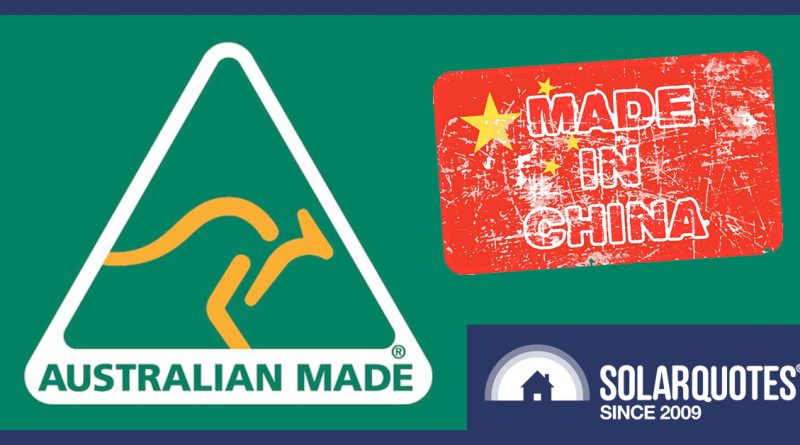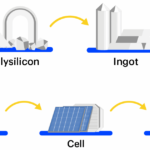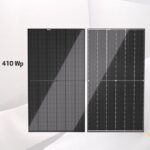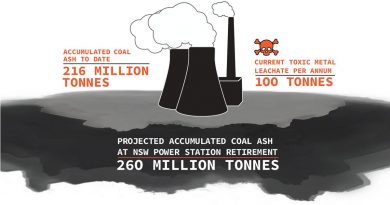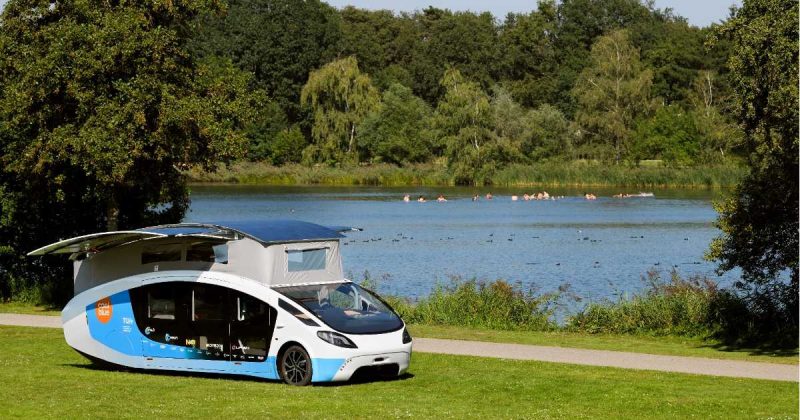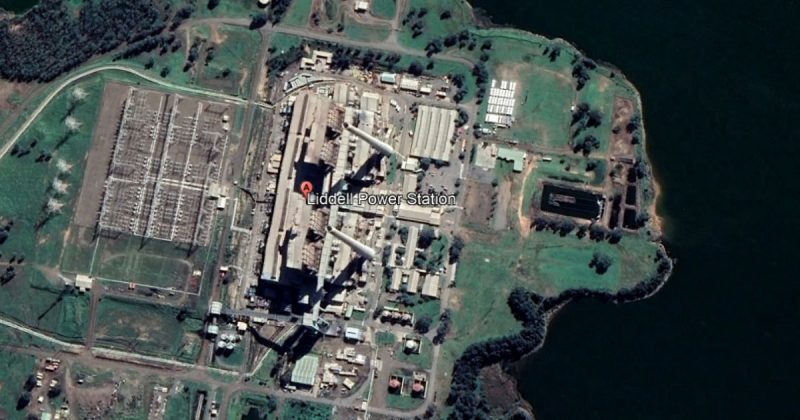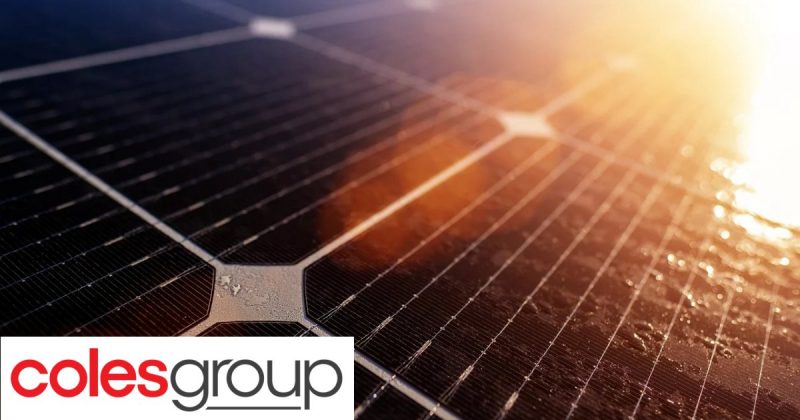Buying Imported Solar Panels Does Not Hurt Australia
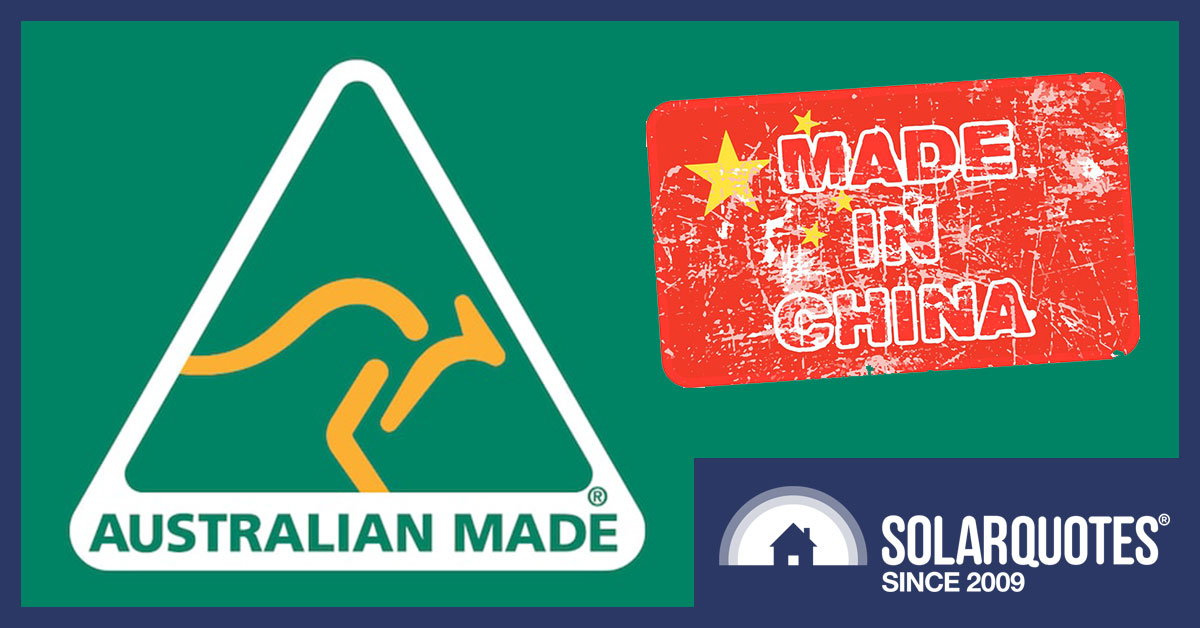

If you want Australian made solar panels, I recommend Tindo Solar. They have a track record of quality panel production nearly a decade long. But you’ll pay a premium for Australian made.
If you’re happy to pay extra, this isn’t a problem. But if you choose cheaper, imported panels are you harming our economy by not buying an Australian-made product?
To be clear, if you buy foreign panels, you won’t be supporting Australian solar panel production. But you will be supporting the Australian economy just as much as spending the money on Australian-made goods.
Foreigners refuse to give us solar panels for free. We can only get these cheeky foreigners to give us solar panels by providing Australian goods and services in return. So every dollar spent on overseas solar panels is a dollar that gets spent on Australian production. This applies to everything we import.
Sure, we’d be better off if foreigners sent us free stuff. But that’s not going to happen.
I know many people reading this will have this strong gut reaction:
Ronald, you’re a fool! There must be a loss to Australia when overseas products are bought.
So I’ll spend the rest of this blog post explaining why this reaction is wrong.
You Can’t Import Without Exporting
On the topic of international trade, the one overarching point I want to make is:
You can’t import without exporting.
If Australia stopped importing, it would ruin our export industries.
I was born in Toowoomba. It’s the service centre of the Darling Downs, a major producer of cotton, beef, wheat and other agricultural products. Much of this is sold overseas. Australia is the world’s…
- 3rd largest cotton exporter
- 2nd largest beef exporter
- 3rd largest wheat exporter1
Toowoomba’s economy is dependent on these exports. If Australia stopped importing, the livelihoods of tens of thousands of ordinary Australians — as well as plenty of weird Australians — would be in tatters.
This is because the only way you can export without importing is to give away stuff for free, and I’m pretty sure the people of the Darling Downs won’t be thrilled with that idea.
The products we import from overseas pay for our exports and vice versa.
How Imports Pay For Our Exports — An Example
Every dollar we spend on imports is matched by a dollar in exports. Say you want to build a small solar farm and pay Jinko Solar — the world’s largest solar panel manufacturer — one million dollars for 7,500 solar panels.
[embedded content]
You now have 290 pallets of panels, and Jinko Solar has one million Australian dollars. You’ve got what you want, but Jinko Solar doesn’t have anything immediately useful to them. They can’t use Australian dollars to pay their workers or buy inputs to manufacture solar panels.
Xiande Li, the CEO of Jinko Solar…


…can’t use it down at the noodle bar to buy lunch.


This is because the noodle bar only accepts Chinese yuan. So if Mr Xiande wants to use the $1 million Australian, he’ll have to exchange it at the bank for Chinese currency.
But a Shanghai bank doesn’t want Australian dollars either. They will act as a middleman and pass the AUD on to someone who can use it — an individual or company wanting to buy Australian goods or services. This is the only real reason anyone not a notaphilist wants Australian dollars. To buy something Australian with them.
Although Xiande Li can’t spend the Australian dollars at the local noodle bar, they could end up paying for Australian wheat used to make their squiggly food. Around 34% of the wheat Australia exports is used for noodles, so some Shanghai food wholesaler could buy those AUD from the bank to buy the Australian Standard Noodle Wheat that ends up in Mr Xiande’s lunch.
Nothing Changes If A Bank Isn’t Used
Nothing changes if Jinko Solar doesn’t exchange the one million dollars at the bank and use it to buy goods from Australia directly. It still ends up paying for Australian production. For example, Jinko uses tens of thousands of tonnes of aluminium each year for solar panel frames, so they could use it to purchase Australian aluminium ingots directly. The Australian dollars still end up being spent on Australian products.
But I Buy Chinese Stuff With US Dollars!
If you’ve ever bought anything directly from China — or many other countries — there’s a good chance you paid with US dollars. This doesn’t change anything. It’s just an extra step. It works like this:
- You exchange Ozzie dollarydoos for US dollars at a bank or other financial institution.
- You pay for your Chinese goods in US dollars2.
- The seller in China exchanges the US dollars for Chinese yuan.
The US dollar is the middleman currency of the world because, despite Donald Trump’s best efforts, the US is still a superpower, and its dollar dominates international trade. The US dollar is convenient because its cost of exchange is low. This is because it’s very liquid. This doesn’t mean Jeff Bezos puts hundred dollar notes in a blender with half a bottle of vodka to make cocktails3. It means there’s always lots of US dollars being traded, so banks never have to hold onto them for long.
Trade Deficits & Surpluses
If exports equal imports, you may be wondering how a country can run a trade deficit or surplus. What happens is, when Australia runs a trade deficit, we import more goods than we export and promise to pay back the difference later. When we have a trade surplus — currently, we’re running one at a record level — it works the other way. When you add in what people owe each other, imports equal exports.
Employment Should Be A Wash
Many Australians, including plenty of farmers on the Darling Downs, work in export industries. Because of this, buying products made overseas should have little effect on employment one way or the other. When you spend money buying overseas solar panels, it keeps Australians in export industries in work.
Trade is — Usually — Win-Win
Trade is — usually — a good thing. If it wasn’t, people wouldn’t do it4.
We’ve all made purchases we’ve regretted, but very few of us want someone else in control of what we can buy. It doesn’t matter if the person in charge is a loving parent who only wants what they think is best for us or Uncle Stalin who only wants what’s best for the worldwide revolution and doesn’t care how many eggs get broken5.
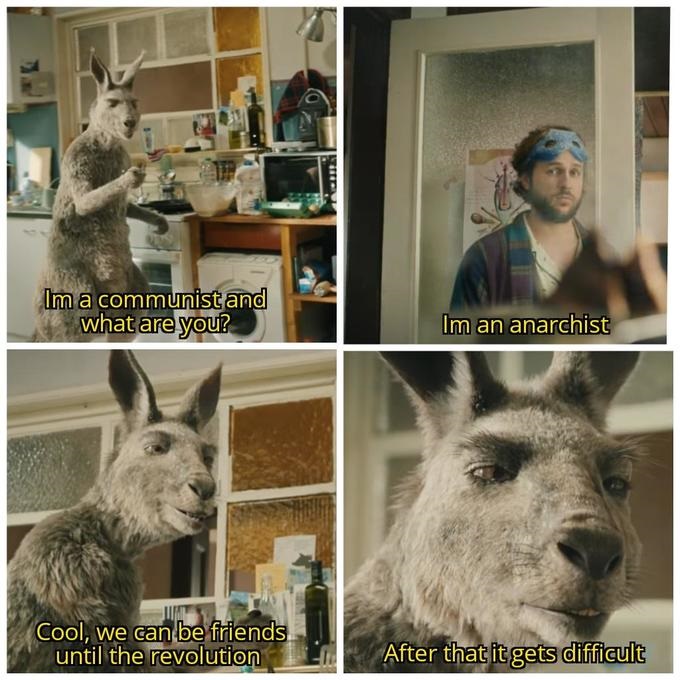
Germany has a movie about a communist kangaroo because, of course they do. (In this scene, the kangaroo appropriates people’s eggs to break.)
Because I don’t want to be told how to spend my money, I extend the same courtesy to others. Sure, I might think the stuff you buy is stupid, but I’ll usually keep that opinion to myself.
So whether you want to:
- Pay extra to get Australian made solar panels, or…
- Buy overseas made panels to save some money.
Either choice is fine with me. Unless you buy panels from a manufacturer without a good reputation. In that case, it doesn’t matter where they were made, I’ll either think you were stupid or — if you were taken advantage of by some sleazy salesperson — I’ll feel sorry for you.
Trade & The Environment
Some may say I’m a hypocrite because I’m against people freely choosing to buy and burn fossil fuels. But this isn’t free trade because the action harms others. Not just the buyer or seller, but the planet. We have to accept some risk of things going wrong, but destabilizing climate and potentially destroying the world’s ability to feed itself is not reasonable.
One environmental concern involving trade is shipping consumes 4.8% of world oil consumption. This isn’t good, but there are also efficiencies and emission reductions from producing products in some locations and shipping them to others. For example, New Zealand and Norway’s low emission electricity means they produce some of the world’s cleanest aluminium.
The world should directly solve the problem of emissions from cargo ships by reducing emissions from cargo ships, rather than indirectly by reducing trade6.
Imports Make Our Lives Better
Some people are dead set against imports. Usually not dead set enough to not buy them when it’s to their benefit, but enough to complain about it at length on the internet that was developed mostly in the US and UK, using a device made of components invented and manufactured around the world, and assembled in China.
International trade benefits Australia by giving us more products to choose from while we specialise in some areas and benefit from other nations’ specialisations. Australians are better off with trade than without it. We’d all be a lot poorer if we tried to make everything ourselves.
Let me put it this way — if you want a country of 26 million to produce all the components that go in a modern smartphone, good luck.


But we could stop importing if we wanted to. We’d all be a lot poorer, but we could get by. No one would have to die. Apart from those who need the latest medical advances to stay alive. We’d just have fewer toys like smartphones, or conveniences such as cheap clothes or petrol for our cars. But other countries are not as fortunate and can’t stop importing.
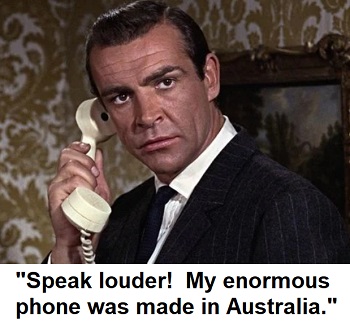

Paranoia Is A Good Servant But A Lousy Master
Some people are convinced China is hellbent on world domination — or at least Australian domination. They think if you buy anything from China, it will somehow assist China’s murderous plans.
Our best hope for the future is for all nations to become rich and peaceful, and trade is one of the best tools we have for achieving this.
To refuse to trade in the hope of avoiding a future conflict is — outside of some specific circumstances7 — counterproductive.
Doing What You Want To Do Is Fine
If you want Australian-made solar panels, you can pay a premium and I can recommend Tindo Solar. You’ll be supporting the manufacture of panels in this country. If you consider the extra expense well worth it, then Australian-made panels are the best option for you.
If you decide to buy solar panels made overseas, you won’t be supporting the manufacture of panels here but you will be supporting Australian export industries. Because the money you send overseas will be spent on Australian exports, it won’t cause the Australian economy any harm.
Footnotes
- Canada is usually ahead, but we’re taking 3rd place this year. ↩
- If an online merchant allows you to order and exchange money simultaneously, this doesn’t change what happens. ↩
- He only does this with Picassos. ↩
- I’m not referring to situations where people are coerced, conned, exploited, or enslaved. I’m talking about people freely deciding to trade something they have — usually money — for something they want more. ↩
- just so long as no Ukrainians get to eat the delicious omelettes that result. ↩
- I favour a carbon price to reduce emissions from shipping. Still, most of the benefit at the moment seems to come from companies wanting to look less shitty, so keep putting pressure on shitty companies that don’t cut emissions. Also, watch out for companies that only pretend not to be shitty. ↩
- Yeah, Stalin probably shouldn’t have sent all that grain, wood, and oil to Nazi Germany. ↩
Original Source: https://www.solarquotes.com.au/blog/imported-solar-panels-australia/

